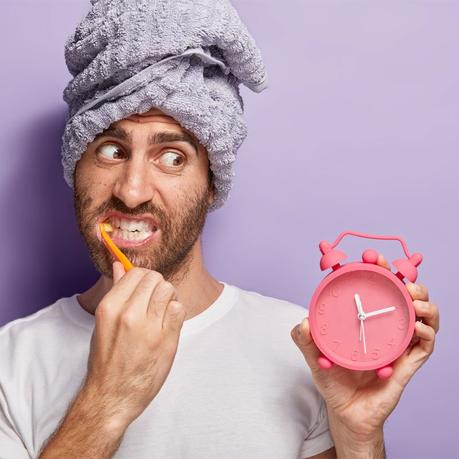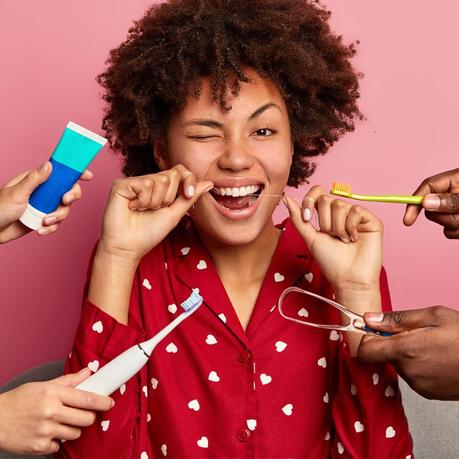
When you brush your teeth, do you take the recommended two minutes? This can feel like an eternity when all you want to do is bed head, so maybe you’ve considered what would happen if you stopped brushing. Would your teeth fall out, or would you be okay to keep watching to learn which approach would lead to losing teeth and which leads to pearly whites?
If you stopped brushing your teeth and forgot all about oral health, as in didn’t floss, didn’t use mouthwash, did nothing for your teeth for a year, zero nada Niente, it’s not pretty. Bacteria will accumulate in your mouth if you don’t brush your teeth for a day; food particles remain lodged between your teeth, creating a breeding ground for bacteria. Over time these bacteria would spread to your tongue and gums as well. You develop a sticky film called a plaque. Everyone gets plaques to a certain extent. It’s the thing your hygienist spends so much time trying to remove during a dental cleaning. You might have difficulty noticing that plaque is developing because it’s colourless and difficult to see. If your teeth aren’t straight, you can expect even more plaque to accumulate.
When plaque isn’t removed daily, it can become quite hard and lodged in place. This can develop into tartar, not the yummy tartar sauce that’s super tasty with fish. You don’t eat this tartar because it would eventually eat your gums painfully.
What Happens If You Don't Brush Your Teeth
Gingivitis
You would hurt your gums now when it comes to your mouth; your gums need some loving too. During a year of no brushing, you’d likely be suffering from swollen and tender gums. If your teeth are carrying a ton of bacterial, plaque and tartar, you can expect your gums to bleed from time to time. You will likely develop gingivitis. Which is the mildest form of gum disease. At the end of the year, you could reverse gingivitis with the help of a dentist and medications. But it would take a little while.
Periodontitis
If left untreated, gingivitis can develop into periodontitis. That’s when bacteria in your mouth throw an extravagant party because they’ve found a lovely home. A bacterial infection sets in and starts to break away at the bones that support your teeth .once that starts to happen, it’s hard to prevent someone from losing their teeth.
What Causes Bad Breath and relation with Brush Your Teeth
People might start taking a step back when they talk to you. You know the smell of morning breath; your mouth would smell like that 365 days a year. There would be no escaping onion or coffee breath or the scent from smoking. Your teeth would be carrying food particles, which would produce bacteria, that is, shall we say, potent in odour. Mouth bacteria can smell a warning to the person that there’s a problem instructing them to clean their mouths. Your bad breath might be saying that you’re developing gingivitis. It could also be a warning that an underlying medical condition needs attention, perhaps kidney problems. If you get used to the smell of your breath, you might ignore its purpose as a warning system and miss an important health sign. Your social anxiety levels might go up if you notice that people aren’t interacting with you in a respectful manner, and you might become self-conscious. You might also get a nickname behind your back, like smells like death or old landfill breath.
QUALITY AFFORDABLE DENTAL IMPLANTS
Copperhills Family Dentistry specialists provide specialized dental services that help our patients cultivate healthy and happy smiles. We’re happy to provide compassionate care coupled with cutting-edge technology.
Read moretooth demineralization and relation with Brush Your Teeth
You might suffer from tooth demineralization. Your teeth need minerals so they can remain strong. As you age, you naturally lose minerals in your teeth. This is why elderly teeth can be weaker. This process would occur much more quickly if you ate a lot of sugar and highly acidic foods and stopped brushing your teeth. Minerals like calcium and phosphate are necessary to keep your enamel strong and prevent tooth decay. After a year, none of your teeth would likely be too demineralized to fall out. But you would be on the way to losing your enamel and the bones that support your teeth. Once they’re gone, there’s no way of recovering them. In the long run, you’d have a high risk of losing teeth. As promised, there is a way to get pearly whites at the end of a year without brush your teeth.

Whitening Read More cosmetic
dentistry Read More dental cleaning
and checkups Read More
Tips for taking care of your teeth and Brush Your Teeth
It involves taking care of your teeth with some alternative methods counting down from method.
4. Mouthwash
You won’t have to worry about bad breath if you use mouthwash. Your breath could stay minty fresh all day. Your mouthwash could also help prevent cavities and fight gum disease if it contained alcohol and chlorhexidine. Certain mouthwashes are therapeutic mouthwashes that can control plaque gingivitis and tooth decay. Several are available over-the-counter, so you don’t have to visit a dentist to get a prescription. These types of mouthwashes could help you with any canker sores you develop in the year by detoxing the area and if your mouthwash has fluoride. It could help in reducing demineralization and cavitations of the teeth. But this wouldn’t be possible for children under six since the American Dental Association a DA advises them not to use mouthwash as they’re likely to swallow it.
3. Flossing Can Be Extremely Effective
Flossing is more important than brushing. If you stop brushing for a long time but continue to floss, you’d save your teeth from any plaque buildup between the teeth and right by the gums. Brushing and flossing are both important. But flossing can get those hard-to-reach areas that a brush can. In the long run, flossing would prevent you from developing gum disease. You just need to make sure you’re flossing once a day. As long as you didn’t let more than 24 hours pass without flossing, you’d be alright. The front of your teeth might still get stained since they’re not getting any attention, but you can prevent that if you watch what you eat alternatively.
2. Avoid Sugar
Before you say you could never quit sugar, just know that it could be the best way to successfully get out of brushing. The best way to prevent cavities is not to brush but to avoid eating sugar and other simple carbohydrates. Why is that? Your mouth is always hosting bacteria; certain bacteria are more harmful than others, and the most dangerous type is the one that loves the munch on the sugar in your teeth. So when you eat a lollipop or a piece of cake, it isn’t just delicious for you. Certain bacteria are throwing a feast in your mouth bill. The bacteria emit assets that can destroy your tooth enamel and form infections, leading to cavities. Staying off the sodas, cookies and sugary snacks is good for your teeth. You wouldn’t have to worry about cavities and might even shed a few pounds if you did this.
1. Certain Foods Can Whiten Your Teeth
You don’t need a toothbrush and whitening toothpaste for your teeth to be pearly white. You simply have to stay away from foods that are acidic and lower your mouth’s pH levels and veer toward foods that are high in alkaline content and raise the pH levels. Apples are a great choice because they’re an alkaline fruit and take the stains off the teeth. Sweet potatoes can help whiten the teeth. Pineapples contain bromelain, an ingredient that helps remove stains and toothpaste. Strawberries contain malic acid, which can help prevent gum inflammation. Rubbing your teeth against the inside of an orange peel will put your teeth in contact with lemonade, a substance used in many teeth whitening products. If you did this, you might even end up with whiter teeth, and you started with.
recommendations of the dental community for Brush Your Teeth
Of course, remember that the safest approach is always to follow the recommendations of the dental community when it comes to taking care of your teeth.
- According to the ad, people should brush twice a day.
- It’s also recommended that you floss daily.
- If you want to make a change in your oral health routine, don’t hesitate to visit your dentist, as they might be able to create a plan for you that works with your lifestyle.

